It is still no clearer what was really going in with the failed coup attempt in Turkey. Some are still claiming Erdogan and his people initiated a false-flag coup themselves, while others are pointing to a failed, Washington-backed coup attempt.
And if you’re looking for a definitive answer, you’re not going to get it in this article.
What you’ll get here instead is a continual attempt to make sense of a confusing situation in an absence of definitive information. But this time we’ll also pay more attention to the Gulenists blamed by Erdogan for the plot.
Erdogan’s subsequent purge, not just of the military, but of the judiciary and police force doesn’t do much to dispel accusations that he may have organised the failed coup himself in order to provide the premise for his subsequent actions.
However, as will be shown shortly, there may be some justification – as ugly as it looks – for this move, despite the surface appearance of a Hitler-like ‘Night of the Long Knives’.
The purge has now also extended again to academics and universities. Authorities are reported to have canceled the licenses of some 21,000 private-school teachers, bringing the alleged total number of dismissed professionals to almost 60,000. The apparent fact that the authorities were able to target such a large number of specific individuals or associations so quickly is cited by some as evidence that Erdogan’s people planned the coup. Turkey is also, like France, entering a state of emergency.
But the meme of Erdogan the Ruthless Dictator – which I myself am guilty of too quickly falling into – may not be sufficient to explain or understand this increasingly toxic situation in Turkey.
Only a few names of the estimated 6,000 persons being detained in direct connection to the coup plot itself have been made public. As NSNBC notes, ‘This situation makes it difficult for journalists to assess who was behind the failed coup and to determine the alleged perpetrators eventual affiliations and motives. It also makes it difficult to assess who may eventually be “targeted” by a purge. Some of the soldiers who were arrested claimed they believed that they took part in a military drill until they were confronted by protesters and police.’
This claim that many of the soldiers had thought they were taking part in a ‘drill’ is more than curious: and has been widely reported by now.
In fact, a dual Turkish-British citizen I spoke to told me his brother was in Istanbul on the night of the ‘coup’ attempt and had actually arrived at the airport while the chaos was unfolding. I obviously can’t 100% verify this story, but according to him the ‘coup’ soldiers trying to control the airport appeared confused and badly organised, eventually departing when they saw how many civilians were there.
Interestingly, he also claims these soldiers weren’t wearing proper uniforms and that their garb didn’t bear any Turkish army symbols or flag – which, if true, makes this all even more confusing (but might actually support the foreign-plot theory).
A Hurriyet article, published on the Turkish newspaper’s English-language website on 17th July: ‘Student soldiers in Istanbul’s Kuleli Military High School were also reportedly taken to streets by their commanders, who claimed it was for a drill. They seized weapons of police officers in the Cengelkoy police station. An armed conflict erupted and 10 people were killed. Special operations police officers later raided the school and detained many students. In addition, soldiers at Istanbul’s Ataturk Airport said in their initial testimonies that they thought they were on a drill, but later realised it was a coup when people climbed onto their tanks…’
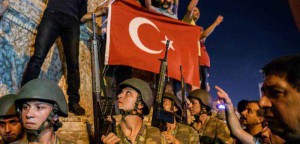
So who told them they were on a drill? Erdogan/AKP loyalists in the military, trying to simulate a fake coup? Or officers loyal to their enemies, the ‘Gulenists’ – and being orchestrated from abroad?
The exiled ‘opposition’ figurehead Fethulleh Gulen – accused by Erdogan of being behind the coup – has been linked to the Turkish Deep State, the CIA and NATO intelligence by several sources.
Former FBI translator, Turkish-born Sibel Edmonds is adamant that the attempted coup was orchestrated by the US Deep State. She has said she would like to see the Turkish people move to shut down all US embassies, consulates and think tanks – which chimes pretty much with what Erdogan has been doing. Edmonds describes Fethulleh Gülen as an “extremist” and “terrorist”, currently under criminal investigation by the FBI for money laundering, among other things.
In regard to Gulen, the info war becomes just as conflicting and confusing as the coup attempt itself. Gulen appears to be a more insidious character than Erdogan.
Edmonds describes his allegedly ‘moderate’ schools as “madrasas” that are spawning extremism worldwide and she describes Gülen as wanting to see Sharia Law implemented in Turkey; this is in total contrast to other claims that the Gülenist Movement is ‘moderate’ compared to Erdogan’s Islamism and that Gulen is the more ‘secular’ voice. But Edmonds cites Gulen as head of a fundamentalist Islamic movement in Turkey (with the support of the Clinton Foundation).
This view of Gulen and his movement is shared by others, including very well placed sources – one of whom I will cite later.
The problem with this version of events – thought it may be true (as will be argued in a moment) – is that the behaviour of some elements of Erdogan’s supporters suggests that, at best, there may be little ideological difference between a lot of Gulen’s and Erdogan’s respective core support – both being hardline Islamist in nature (allegedly); which makes the conflict between them all the more difficult to understand.
21st Century Wire noted, ‘The fall-out from Friday’s failed coup d’etat in Turkey has been more gruesome than many imagined, as pro-government AKP and Muslim Brotherhood supporters have taken to the streets to administer what some describe as an ‘islamofascist’ brand of justice, apparently, doing so on behalf of the ruling party… Erdogan’s AKP supporters and the Muslim Brotherhood followers, who were being summoned onto the streets by the Imams as the call for prayer resounded across Istanbul and Ankara, are now turning on the military and civilian dissidents. Reports of lynchings and even beheadings are now shockingly prevalent particularly on Twitter that has been real-time reporting on events as they unfold.’
We should be wary of trusting Twitter and social media sources, of course – because we know for an absolute fact that such accounts can be faked by intelligence agencies, as was done in the early months of both the Libya and Syria crises in 2011.
But it appears, according to those various sources, that Erdogan’s remote call on his supporters to go out into the streets and oppose the coup soldiers resulted in some street violence, guided via AKP-aligned Imams in mosques. The result, in some cases, appears to have been some AKP supporters and followers of the Muslim Brotherhood seeking to ‘hunt down and punish any military and civilian dissidents. On top of that, the government appears to have issued ‘stand down’ order to police forces regarding the AKP and Muslim Brotherhood ‘street justice’ witnessed this weekend – allowing the torturing and public slaughtering of any unarmed, low-level military conscripts who are perhaps only pawns in a much larger geopolitical drama.’
What is particularly distressing in these reports is how much of a resemblance there is to certain events in Ukraine, and in Libya and Syria. It seems to have been agreed by various outlets that at least one Turkish soldier was beheaded by one of the civilian mobs.
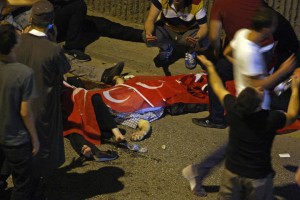
If the stories of Turkish soldiers being lynched – and even beheaded in one case – are true, it would bear a startling resemblance to Libyan army soldiers being lynched and suffering gruesome deaths at the hands of Islamist/jihadist mobs back in 2011 or similar instances involving Syrian army soldiers and so-called ‘peaceful’ or ‘moderate’ opposition.
That sense of deja vu is also reinforced by the claims of Muslim Brotherhood Imams and mosques being behind much of the populist ‘street movement’ that Erdogan called out into the streets: echoing, rather worryingly, the extremist Imams and mosques used as Al-Qaeda bases in Libyan cities in the early weeks of the uprising against Gaddafi.
In that instance, it was NATO, the CIA and Western intelligence using jihadists and extremists to rise up against the Libyan Socialist Republic; but in this instance, it appears to be Erdogan’s supporters engaging in this strategy – even though we’re being told it was Erdogan’s enemies engaging in the CIA/NATO-backed plot to overthrow the government.
Still very confusing.
Amid the ongoing censorship operation in Turkey, the state under Erdogan has just blocked access to the Wikileaks website after the the organization released some 300,000 documents of internal communications among the AKP ruling government. Though Wikileaks warned Turkish censorship would be nearly inevitable, the site came under “sustained attack” from an unknown source just prior to the leak, even though WikiLeaks had stated the files did not relate to the failed coup attempt.
Curiously – though unrelated to the events last week – it emerged in recent days that there may be links between the AKP in Turkey and the Al-Qaeda/ISIL aligned leader AbdelHakim Belhaj. NCNBC reports, from the WikiLeaks ‘300,000 e-mails styled to Turkey’s ruling AKP. While no link to the “failed” military coup on July 15 was discovered, the cache contains mails suggesting that Libyan Al-Qaeda leader AbdelHakim Belhaj reached out to acquire help with laundering and investing funds stolen from the ousted Libyan government in 2011… All of the emails which were released were attributed to Turkey’s AKP at akparti.org.tr, which is the primary domain of Turkey’s ruling party. The mails cover a period from 2010 up until July 6, 2016. That is, a few days before the “failed” military coup on July 15.’
Links between the AKP and the LIFG (the ‘Libyan Islamic Fighting Group’ that had been trying to overthrow Gaddafi for many years) have been alleged since the events of the Libyan Civil War in 2011. The WikiLeaks reveal might be the first item to give some substantiation to this.
All of this being said, it is still no clearer what the truth is concerning the coup attempt last week.
There are still conflicting theories and positions. A cursory glance at these events and Erdogan’s subsequent actions (and there’s no real justification for a country bringing back the death penalty when it has already evolved beyond that) makes it difficult to see Erdogan as the ‘Correct Side’ of the divide: but that cursory glance may be deceptive, as Sibel Edmonds suggests.
The portrayal of Fethulleh Gulen as a more ‘moderate’ opposition to Erdogan appears to be deliberate camouflage for something very different.

In a 2009 study of Gulen, Rachel Sharon-Krespin (director of the Turkish Media Project at the Middle East Media Research Institute), writes, ‘Fethullah Gülen is an imam who considers himself a prophet. An enigmatic figure, many in the West applaud him as a reformist and advocate for tolerance, a catalyst of “moderate Islam” for Turkey and beyond. He is praised in the West, especially in the United States, as an intellectual, scholar, and educator…’
But later she expands this assessment of Gulen beyond the veneer (and in so doing may have helped explain why Erdogan would now be moving to purge academia, universities, as well as police and other institutions); ‘The core of Gülen’s network is his educational institutions. His school network is impressive. Nurettin Veren, Gülen’s right-hand man for thirty-five years, estimated that some 75 percent of Turkey’s two million preparatory school students are enrolled in Gülen institutions. He controls thousands of top-tier secondary schools, colleges, and student dormitories throughout Turkey, as well as private universities, the largest being Fatih University in Istanbul. Outside Turkey, his movement runs hundreds of secondary schools and dozens of universities in 110 countries worldwide. Gülen’s aim is not altruistic: His followers target youth in the eighth through twelfth grades, mentor and indoctrinate them in the isikevi, educate them in the Fethullah schools, and prepare them for future careers in legal, political, and educational professions in order to create the ruling classes of the future Islamist, Turkish state. Taking their orders from Fethullah Gülen, wealthy followers continue to open schools and isikevi in what Sabah columnist Emre Aköz called “the education jihad.”..‘
Concerning purpose and motive, she continues, ‘Bayram Balci, a French scholar of Turkish origin, wrote, “Fethullah’s aim is the Islamization of Turkish nationality and the Turcification of Islam in foreign countries. Dozens of Fethullah’s ‘Turkish schools’ abroad—most of which are for boys—are used to covertly ‘convert,’ not so much ‘in school,’ but through direct proselytism ‘outside school.'” Balci explained, “He wants to revive the link between state, religion, and society.”… Fethullahists have also made inroads into Turkey’s 200,000-strong police force. Their infiltration has had a compounding effect, as Fethullahist officials have purged officials more loyal to the republic than the hocaefendi. According to Veren, “There are imam security directors; imams wearing police uniforms. Many police commissioners get their orders from imams”...’
This analysis of the Gulenist movement and its ‘prophet’ completely contradicts the prevailing mainstream portrayal.
In 1999, Turkish television aired footage of Gülen delivering sermons to a crowd of followers in which he revealed his aspirations for an Islamist Turkey ruled by Shari‘a (Islamic law) as well as the methods that should be used to attain that goal. In the sermons, he is reported to have said: ‘You must move in the arteries of the system without anyone noticing your existence until you reach all the power centers… You must wait until such time as you have gotten all the state power, until you have brought to your side all the power of the constitutional institutions in Turkey…’
Evidently, there may be justification for some of what Erdogan is doing in terms of trying to purge the police, army, universities and schools, etc, of suspected Gulenists, who he has long accused of maintaining a “parallel state” within Turkey.
The problem is, because Erdogan himself is so ambitious, so self-cast in the mold of the dictator/would-be-Sultan, it *looks* so much like he is simply consolidating his own power – even if what he is doing is strategically necessary and in the best interests of modern Turkey.
However, it is also likely that this purge is going beyond Gulenists and taking the chance to neutralise any other meaningful opposition too.
Sibel Edmonds also believes this shambolic, failed takeover was a dry run for a bigger CIA/NATO/Gülenist coup yet to come.
If this was a foreign-backed coup attempt, then it not only strengthens Erdogan’s position but also could be seen to validate him as the rightful leader of Turkey at this time – because any foreign-backed coup and subsequent government is illegitimate by its very nature, particularly when the deposed leader has so much popular vindication and support from his people.
Although I allowed for all possibilities, my initial leaning towards the coup being a valid attempt by the military to oust the dictatorial and increasingly Islamist Erdogan was based on the assumption that this was a desperate act to restore a fully secular republic and halt the Islamisaton of Turkey. This may have been a misreading of the situation – as, if the Gulenists were behind this move, then a preservation of the secular republic was probably never the intention.
The mistake we sometimes make as observers is to try to see things in terms of ‘right’ and ‘wrong’ or The Good Guys and The Bad Guys; and the problem is that much of the time the truth isn’t so simple and the reality is much more complicated. I admit that I’ve been doing that too: someone like Erdogan appears so much The Bad Guy so much of the time that it’s easy to fall into the trap of seeing things in black-and-white, when the reality is in fact a vast shade of grey.
I will absolutely admit that my non-Turkish view of Erdogan has been coloured very much by my own partiality towards secular government, a dislike of authoritarianism, and a distaste for the Turkish state’s actions in Syria. In all of that, people like me sometimes fail to always see things from the right perspective – in this case, the perspective of Turkish sovereignty and the wishes of the Turkish people.
52% of voters genuinely appear to love Erdogan and there are some obvious reasons for this. Average income has increased under his administration, as has job creation. Inflation has massively lowered, and Erdogan has managed to fully pay off Turkey’s IMF debt.
For everything wrong with his way of operating, Erdogan has worked economic wonders for Turkey, and to many he is much more trusted than past governments or the alternative forces that tend to shape Turkey’s destiny – such as, according to many, the Gulenists.
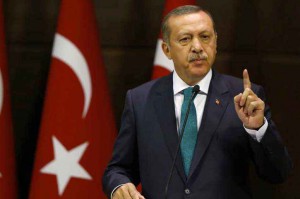
In many ways, Erdogan and Gulen seem to share similar outlooks – neither seems to want a secular Turkey in the long run, both are essentially Islamist in outlook, and of course they used to be allies with a shared ideology. To liberals and secularists in Turkey, Erdogan and Gulen might be seen as more or less as bad each other.
The difference, it might turn out, is that Erdogan might be the lesser of two evils: because he is (on the surface, at least) democratically elected and many believe he is a likelier ensurer of democracy than his opponents are.
Moreover, he is perceived as at least a wholly Turkish leader, whereas Gulen is seen as being both foreign-backed and more of an internationalist Islamist.
Prior to Erdogan’s original election, Gülen and his supporters in the United States helped obtain an invitation to the White House for him at a time when Erdogan was banned from politics in Turkey due to his Islamist activities — ‘an event,’ Rachel Sharon-Krespin told us, was ‘viewed as a U.S. endorsement ahead of the 2002 Turkish elections.‘
Subsequently, Erdogan and Gulen, once they had neutralised much of their shared opposition – and despite sharing various similar values and aspirations – later turned against each other: and what is happening now might be characterised as a kind of Civil War between two Islamist movements for control of what is meant to be a secular republic.
In that scenario, most Turks – including even those who otherwise dislike Erdogan – may have simply decided they were better off with the devil they knew rather than a foreign-based demagogue who is possibly backed by the CIA and who appears to have even less respect for secular principles than Erdogan does.
Essentially, many Turks may be caught between a rock and a hard place – having to choose between something they don’t like and something they like even less. It has been the same elsewhere too, of course; such as countless Syrians who never liked the prevailing Syrian regime, but have nevertheless liked Assad’s opposition factions even less, or the many Iraqis who hated Saddam but now long for the old days before he was toppled.
_________________
It may also be that those behind the plot deliberately used other elements of the military – including many who weren’t even aware they were taking part in a coup – in order to move under cover of the military’s established role as guardians of the secular state and constitution.
I previously tried to highlight the 3 possible explanations for the failed coup attempt: but what I failed to consider initially is that all 3 explanations might be true to varying degrees – essentially, that some elements of the military may have been trying to carry out a genuine coup, but that it was partly backed from abroad (including Gulenists), and that Erdogan’s people knew it was coming and let it play out, possibly co-opting some of it for their own purposes and having a counter-plan in place to thwart it.
That might account for much of the confusion and conflicting narratives.
In that scenario, the reason Erdogan appeared so prepared – and seemed to already know exactly who to go after in the following days – would be because he was: and he would’ve known that a failed coup attempt would give him carte blanche to go after everyone he had already wanted to go after. In that scenario too, many of the young soldiers involved in the coup wouldn’t even have known what they were really doing and might’ve been told they were on a training exercise.
https://www.youtube.com/watch?v=yzb8k2Cdt4g
In that scenario, it would also be possible that some of the actions taken – supposedly by the coup plotters – were actually carried out by someone other than the coup plotters. It seems odd, for example, that they fired a missile into the parliament building. What would that accomplish other than to turn everyone against the coup and paint the picture of an immoral movement with no respect for democracy or democratic institutions?
Bear in mind that no one has any idea who was in the helicopters that were shown firing from the air above Ankara – it is *assumed* these were people involved in a genuine coup attempt, but it is certainly not clear, and in any case there’s very little identification that has been disclosed so far.
It is also worth noting that although there were reported instances (or accusations) of soldiers attacking police, there were also lots of images and footage of soldiers being attacked by civilians and not attempting to open fire or defend themselves.
All in all, it seems still very unclear what happened and precisely who was behind it. But, perhaps illustrating what a confused and perverse age we now live in, it may ultimately be that Erdogan moving to purge the country of ‘Gulenists’ – however self-serving it might also be – might actually be in Turkey’s best interests (short term) and in the best interests of Turkish sovereignty – even if, as previously discussed, it doesn’t actually lead to a securing of a secular, fully democratic Turkey in the long run (because Erdogan probably doesn’t want that).
I am by no means certain of that (and what is now going on in Turkey in response appears very excessive) – but who can be certain of anything, given such a confusing, complicated situation and such a concerted information war?
We live in a time of maximum confusion and misinformation – or, to quote Orwell, ‘a time of universal deceit’. Figuring out who is right and who is wrong or even what is best is all the more difficult in that climate. That may be something we need to bear in mind more and more in regard to evolving world events.

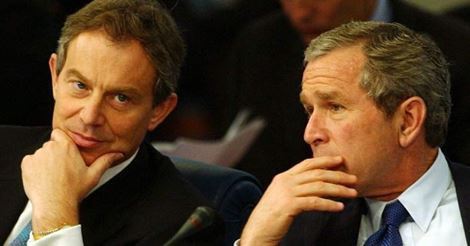
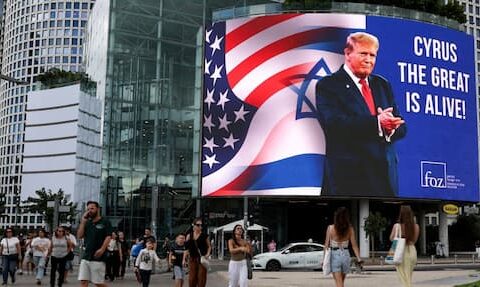
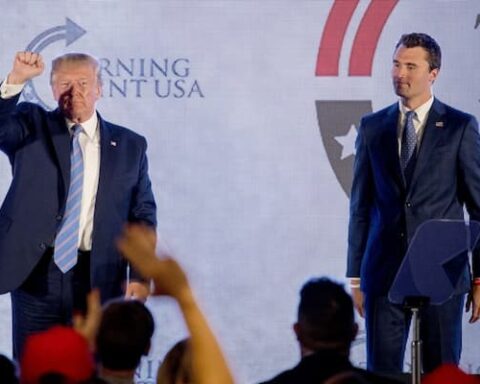

Thanks for reply! Yes I’ve read similar about Ruskies.
I think the lesson of the day is to be aware of how all these database lists of names will someday be used against ordinary citizens in a surveillance society that wants to purge “undesirables” based on their views, followings, or outspokeness.
That’s a serious point – something I think about a lot.
Excellent piece of journalism with thorough attention to facts not collectively available elsewhere. Thankyou for shining expository light on the unknown Gullen factors. Also enjoyed the rare glimpse of an author’s human side and a willingness to sway views as more facts are uncovered; as you so well point out, there still many unanswered questions to the coup whodunit.
Erdogan has broad support but seems to walks a tight rope in the war torn Middle East, and may be becoming privy to how few he can trust for the future of Turkey. He has likely since regretted severing ties with Russia over the downing of a fighter jet in exchage for teetering Western alliances that in the end are alligators waiting below for his fall.
Thanks for pointing out the precise missle strike in the Turkish Parliament which was certainly an awkward twist and possibly revealing one intended outcome of the coup drama. Could it be compared to the Reischstag Fire or the biological warfare attacks on the US Senate just after 911? Interestingly you mentioned Hitler’s purge during the “night of the long knives”, which in 911 could be paralleled to the basic statement that: “if you are not for us, then you are against us”. Possibly the missle strike put the fear of God in the Turkish national legislature and brought them in tow as their post-coup voting record seems to reveal.
It also merits to state that there is also a report that “rogue” Turkish jets locked in on Erdogans plane and escort fighters as they were approaching the Ankara airport, but did not fire on him, though having had the opportunity. All this leaning towards numerous planned and staged incidents with a predetermined outcome all during the otherwise visibly disfunctional coup.
It the end it seems that maybe the people of countries that were once great empires have a deep rooted yearn to see their nation return to a similar level of greatness, hence the sweeping support for Erdogan and the likes of him around the world that promise to make their country “great again”.
One lingering question is how will Erdogan manage the purge of all those relieved of duty…. will he also stage a civil war and put them in the front lines, or is there a far more unseen side of his desire to reinstate capital punishment.
Again, I really enjoyed your article – very nice work!!!
Thanks, truthisstrangerthanfiction.
I think it’s important to remain as ‘neutral’ as possible as an observer and to go with the information rather than with personal biases – and I try to be honest in that way. I don’t have a ‘team’ or any Absolute Position on things: this is the only way to try to remain honest and objective. I don’t like Erdogan or what he is doing – but me not liking shouldn’t allow me to fall into a biased, pre-determined perspective on events. It’s the same with Donald Trump – I don’t like him at all; but I have to acknowledge that he has some very valid points in some areas and that he also seems to speak to a (presently) deep-seated need within a lot of people.
In terms of more specific things: yes, the firing of the missile into the parliament really struck me as odd, as it wouldn’t *favor* the ‘coup’ plotters in propaganda terms.
The thing I’m now hearing a lot is that Washington/Gulen might’ve been behind the coup – but that the Russian gov tipped him off in advance: which was how he was able to prepare for it and steer the events to his own advantage. That seems to make some sense – but, again, I have no idea what the real story is.
Another thing to note is that we were exposed first to the French truck attack, followed within 48 hours the Turkey coup attempt, next came an attack on a police station in downtown Yeravan (ongoing), then lastly we got an attack on Kazakhstan’s National Security Council building in Almaty. All these things happened in quick sequence, all have the effect of putting fear in the publics’ mind, and ALL taken together form an arc of instability around Russia.
Interesting; though I haven’t noticed much reaction from Russian officials to these things.
Reblogged this on Taking Sides.
Well i still believe that it was a foreign attempt to take over by the CIA/ZIONISTS, 2 things point to this. firstly turkey refusing another IMF loan which would mean they will be free and secondly , only a fortnight before the coup attempt, turkey went to russia and held out a hand of friendship, hence the hurried and disorganized coup attempt!
How to write in the uncertainty – yet bring clarity. Turned to your post (arriving), from reading a comment about Russia – missing here and there Putin – and this person’s call re article (about/to/no-guesses-which broadcaster) for; ‘full attention on this stuff surrounding Russia and NATO because the mainstream Media not telling’. From what else might be unintended yet alt. media distractions. Read claims the coup now took Turkey to near-side Russia. ‘Saving Syria’ – no less. As you explore, assume known about this coup happening and, did they have time in preparation to get involved? Or more so, in case of Gulen speculation.
Truly distressing is the dividing-up through the pro-Erdogan section of society, sufficiently sanctioned to oppress all others, attempting to take social prominence. More oppression/less diversity. Whatever better than not goals. Probably goaded on by those looking for opportunity to bag redundant positions left through the purge. The ill-prepared attempt, might indicate ‘never-inteded to succeed’ or maybe, with wider escalation, a desperate now or never push the relative stability over, trying to cause outcomes not initially as apparent in the aftermath? Back to next-level serious wider war concerns? As far as you take us, is the rightful balance of an uncertain line. May this be widely-read, not least for the necessities in approach. Intense and incisive. Extensive. Thanks.
Thanks Mark; I always try to proceed from a non-biased position, no dogma, no ‘team’, no agenda. Sometimes difficult.
The Russian angle is one I’ve been hearing a lot of too, in regard to Turkey situation. Difficult to tell if it relates: Turkey has also renewed relation with Israel, so I’m not sure all these connections are that easy to define or factor in.